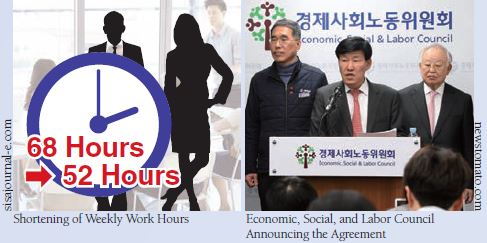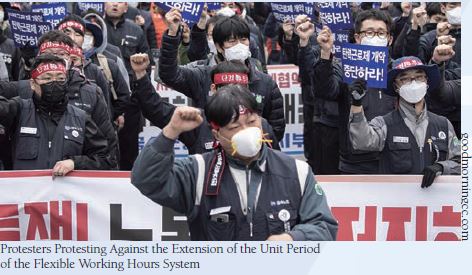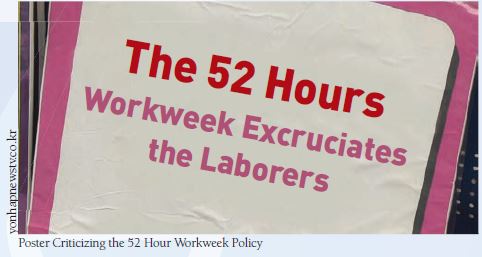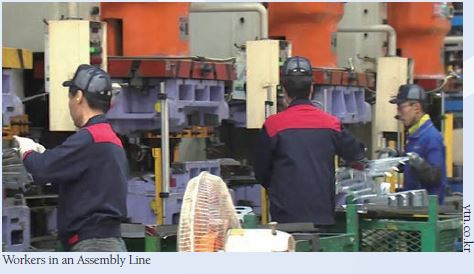currently, the possible extension of the unit period of the flexible working hours system to make up for the issues associated with the newly applied 52-hour workweek is being heavily debated. A work-life balance is an important issue for Kingos who are preparing for the job application period, as well as for Kingos who are not currently preparing to apply for jobs, but will be joining the workforce in the future. Thus, the Sungkyun Times (SKT) digs deep into the heavily debated flexible working hours system unit extension, takes a look into the associated expectations and concerns, and suggests future directions for Korea to achieve a genuine work-life balance.
The Flexible Working Hours System and the Extension of Its Unit
In general, the flexible working hours system period refers to the flexible hours schedule that allows companies to extend the working hours of certain work days and shorten work hours of other days within a unit or a period of time (such as two weeks). The flexible working hours system allows the weekly work hours to average 52 hours (40 legal working hours + 12 extended working hours) per unit of time, with variations in the work hours between different weeks. For example, within a unit of two weeks, an employee could work 58 hours for the first week and 46 for the second week, averaging 52 weekly work hours. In essence, the flexible working hours system is a policy that enables companies to control the working hours of its employees depending on the amount of labor required per unit of a given period. Therefore, the flexible working hours system is especially applicable to industries that are seasonally affected, such as the insulation production industry, and for those with an inconsistent workload, like the construction industry.
The concept of the flexible working hours system first appeared in West Germany in the 1960s and spread to other western countries like the United Kingdom (UK), Canada, and the United States in the 1970s. In Korea, the flexible working hours system was first adopted in 1997, setting one month as the original unit. The unit was extended to three months in 2003 and has not been changed since. The current unit period of the flexible working hours system is within two weeks (that can be set as employment policy by the employer) or within three months (that requires face-to-face negotiation with the employee representative such as the representative of the labor union).

Last year, the 52-hour workweek, a decrease from 64 hours, was officially adopted and enforced. Unfortunately, however, according to survey results released by the Ministry of Employment and Labor (MOEL) in December 2018, a quarter of the companies were not able to meet the 52-hour workweek requirement under the current rules. This was because the demand for labor was greater at many companies than the 52 hours a week. For such reasons, on February 19th of this year, the presidential Economic, Social and Labor Council launched a panel to discuss the potential extension of the unit period of the flexible working hours system amid controversy over the matter. The council ultimately reached the agreement to extend the maximum unit of the flexible working hours system to six months. In response, the Democratic Party and the Bareunmirae Party supported the extension to six months while the Liberty Korea Party argued for an extension to a year, resulting in the nullification of the expansion in the March provisional assembly. Therefore, the agreement was discussed again in the April assembly.
The Expectations and Concerns of the Possible Extension
➊ Expectations
Fitting the Reality of the Workforce
The extension, if adopted, will especially help small and medium sized companies that are heavily affected by employment circumstance changes. In the same context, industries that have certain busy and non-busy seasons like construction, and small and medium sized companies whose overtime is mostly caused by order amount changes, are strongly pushing for the expansion of the unit period of the flexible working hours system to a year. According to these industries, the current flexible working hours system unit period of three months is too short for efficient application. In fact, the current application rate of the flexible working hours system in Korean companies is low at 3.4%. The expectation is that the extension of the unit to a maximum of a year will better fit the reality of the workforce that sets yearly business agendas.
➋ Concerns
The Lack of Constrainability in Wage Maintenance
Wage maintenance refers to the maintaining of the level of wages despite the emergence of wage-declining factors. The major concerns of the labor force stem from the fact that the expansion of the unit period of the flexible working hours system will cause an imbalance of income during busy and non-busy seasons. Currently, if an employer wants an employee to work overtime, the current law states that it must offer 1.5 times the regular payment as overtime payment. If the unit period of the flexible working hours system is extended, however, the employer can make an employee work an average of 52 hours per the flexible working hours system unit without providing compensation even when the employee has worked for over 52 hours. For example, if an employee who gets paid 10,000 won works for six months (26 weeks) of the flexible working hours system, then he would work intensively for 13 weeks out of a total 26 weeks. In this case, the employee would lose the overtime payment of 780,000 won (5000 won x 12 hours x 13 weeks) for the 13 weeks of overtime. This is why the labor force is strongly opposing the expansion of the unit period of the flexible working hours system.

Overwork and the Consequential Decline in Employee’s Health
The current labor law sets the weekly working hours as 40 and the overtime working hours as 12. However, the flexible working hours system allows employees to work for 64 hours (52 hours + 12 overtime hours) at maximum during busy seasons. If the flexible working hours system unit is extended to six months, as an example, then the employer could make the employee work for a maximum of 64 hours for three months, which is against the MOEL’s current standard for death by overwork. According to the MOEL’s overwork industrial disaster recognition standards, twelve continuous weeks of working over 60 hours per week and over 64 hours of average working hours for four weeks before death constitutes death by overwork. While the industry is pushing the flexible working hours system unit period to be extended to a year like other developed countries, it is overlooking the fact that many of the developed countries like Germany and France, have average annual working hours that are only half of that of Korea’s, according to OECD’s statistics released in 2017.

Future Directions to Achieve the Ideal Work-Life Balance
The Establishment of a Systemized Administration and Audit Process
There is a significant need for an appropriate system of administration and audit process. Before rushing into the expansion of the unit period of the flexible working hours system with idealistic standards, a system for auditing and properly punishing the employers that require illegal overtime work or that does not provide compensation must be established. For example, a reporting system that allows employees to report unfair treatment regarding the flexible working hours system to the MOEL, or an audit system in which the MOEL goes through inspection of the employers, should be constructed.
A Need for Efforts to Prevent Overwork
The currently debated agreement includes the so-called “right to rest for 11 hours”. This rule requires employers to guarantee their employees a minimum of 11 hours of rest before the start of their shift. This rule, however, applies only to certain industries such as transportation. Moreover, the rule does not have to be applied when there is no agreement between employer and labor union. Thus, Korea should make additional efforts to prevent overwork. As an example that Korea can learn from, Germany executes what is called a “Labor Hours Accumulation Policy”. The policy allows employees to accumulate labor hours to their hour savings account and later, take rest days with the hours earned. Sometimes the calculation period is short like a month to a year, and there are long-term accounts as well. For such long-term accounts, an employee can use the overworked hours for raising children, education, or for sabbaticals. Compared to the Korean government’s solution to the overwork issue like “the right to rest for 11 hours”, Germany administers a much more helpful compensation for the overwork hours. Likewise, it is necessary to reassure whether the employees are receiving what they deserve and to establish follow-up bills that best represent the employees’ interests.

Currently, South Korea has the third longest working hours among OECD nations. Thus, naturally, the work-life balance feels like a luxury to most working individuals in Korea. As a way to solve such an issue, the Korean government has enforced the 52-hour workweek, but its side effects have caused much disappointment. To ameliorate the circumstances, the flexible working hours system has been offered as a further solution. Amidst the controversies, the SKT expects the extension of the unit period of the flexible working hours system to be a win-win for both employers and the employees.
